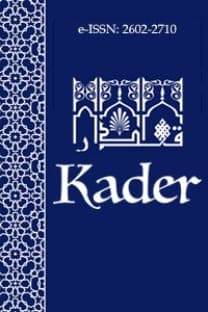İnanç ve İnançsızlığın Psikolojisi: 1
In this study, believer and unbelievers? perceptions are examined in terms of their preferances, image of God and religious-oriented contents which are pray, rituals and fate with using phenomenological psychological methot. In this context, believer and unbelievers? perceptions are seperated in terms of level of education and gender. Less educated believers consider that religion is a aim; on the other hand, high educated believers think that religion is a tool in their life. Women use emotionaly-oriented words such as compassion and love, men use power-oriented words such as greatness and strength to describe religion and related issues. Unbeliver group emphasises individual will and strength. They think that religion and related issues are non-sense and it gives only psychological comfort for believers. Makale Dosyaları Tam Metin
-
In this study, believer and unbelievers’ perceptions are examined in terms of their preferances, image of God and religious-oriented contents which are pray, rituals and fate with using phenomenological psychological methot. In this context, believer and unbelievers’ perceptions are seperated in terms of level of education and gender. Less educated believers consider that religion is a aim; on the other hand, high educated believers think that religion is a tool in their life. Women use emotionaly-oriented words such as compassion and love, men use power-oriented words such as greatness and strength to describe religion and related issues. Unbeliver group emphasises individual will and strength. They think that religion and related issues are non-sense and it gives only psychological comfort for believers
___
- Allport, G. W. (1957). Personality: A psychological interpretation. New York: Holt, Rinehart, & Winston.
- Allport, G. W. ( 2004). Birey ve Dini, Çev: Bilal Sambur, Elis Yay.
- Argyle, M. (2000). Psychology and Religion: An Introductıon. London: Routledge.
- Cevizci, A. (2002). Felsefe Sözlüğü, İstanbul: Paradigma Yay.
- Cirhinlioğlu, F. (2010). Din Psikolojisi. Ankara: Nobel Yay.
- Dawkins, R. (2007). Tanrı Yanılgısı, Çev: Tunç Tuncay bilgin, İstanbul: Kuzey Yay.
- Freud, S. (1999). Dinin Kökenleri, Çev: Selçuk Budak, Ankara: Öteki Yay..
- Giorgi, A. (1976). Phenomenology and the foundations of psychology. In Conceptual foundations of psychology:
- Nebraska symposium, on motivation, 2975, edited by W. Amold, 281-408.
- Lincoln/London: University of Nebraska Press. Giorgi, A. (2009). The Descriptive Phenomenological Method in Psychology. Pittsburgh,
- PA: Duquesne University Press. Hökelekli, H. (2001). Din Psikolojisi, Ankara: Diyanet Vakfı Yay.
- James, W. (1950). The Principle of Psychology, I, New York: Dower Pub.
- Jaspers, K. (1997). Felsefe Nedir, İstanbul: Say Yay.
- Jung, C. G. (1998). Psikoloji ve Din, Çev: Raziye Karabey, İstanbul: Okyanus Yay.
- Kirkpatrick, L. A., (2005). Attachment, evolution, and the psychology of religion, New York, Guilford.
- Korkmaz, E. N., (2012). Bağlanma, İnsan Allah İlişkisi ve Psikolojik Sağlık, Basılmamış Doktora Tezi, AÜSBE.
- Kus, E. (2007). Sosyal Bilim Metodolojisinde Paradigma Dönüşümü ve Psikolojide
- Nitel Araştırma, Türk Psikoloji Yazıları , 10 (20), 19-41. McFadden, H. S. (1996). The Handbook of The Psychology of Aging. U.S.A: Academic Press.
- Mehmedoğlu, A. U. (2011). Tanrıyı Tasavvur Etmek, İstanbul: Çamlıca Yay.
- Mehmet, A. (1999). Din felsefesi (7. baskı). İzmir: IFAD, Yay.
- Özcan, H. (1992). Epistemolojik Açıdan İman, MÜİFV Yay.
- Pascal, B. (2000). Düşünceler, Çev: Metin Karabaşoğlu 3. Basım İstanbul: Kaknüs Yay.
- Price. H. H. (1969). Belief, London: Humanities Press.
- Şahin, N. H.(2010). Stresle Başa Çıkma. Ankara: Tük Psikologlar Derneği Yay.
- Tacou, C. (2000). Din ve Fenomenoloji: Mircea Eliade’ın Eserlerine Toplu Bakış, İstanbul: İz Yay.
- Taylan, N. (1998). Tanrı Sorunu. İstanbul: Ay Işığı Yay.
- Topaloğlu, A. (1996). Çağdaş İngiliz Ateizmi, Doktora tezi, 9 Eylül Üniversitesi
- Sosyal Bilimler Enstitüsü. Topaloğlu, A. (2004). Ateizm ve Eleştirisi. Ankara: DIB Yay.
- Uysal, V. (1996). Din Psikolojisi Açısından Dini Tutum, Davranış ve Şahsiyet
- Özellikleri, İstanbul: M. Ü. İ. F. Yay. Vergote, A. (1999). Din, İnanç ve İnançsızlık, Çev: Veysel Uysal, İstanbul: M.U.İ.F.Yay.
- Willing, C. & Rogers, S. W. (2008). Qualitative Research in Psychology. California: Sage Publications.
- Başlangıç: 2003
- Yayıncı: Mehmet BULĞEN
Sayıdaki Diğer Makaleler
Ebu'l-Müin en-Nesefi ve Kadı Abdülcebbar'a Göre İmanda Taklidin Geçerliliği
Allah'ın Kaderine Kaçmak: Veba ve Kolera Etrafında Tedbir Düşüncesi
Levh-i Mahfuz ve Holografik Evren
İbnü'l-Arabi'nin Fususu'l-Hikem'inde Külliler Meselesi ve Bir Eleştiri
Teklif Karşısında Çocukların Dünya ve Ahiretteki Durumu
İki Dünya Arasında Bir Gerçeklik: İnsanın Sembol Atası Adem'in Yaratıldığı Cennet Algısı
Kadı Abdülcebbar'a Göre Allah-İnsan İlişkisinde İlahi Yardım
İnanç ve İnançsızlığın Psikolojisi: 1
Allah'ın Varlığı Konusunda Erken Dönem İslam Teologları
